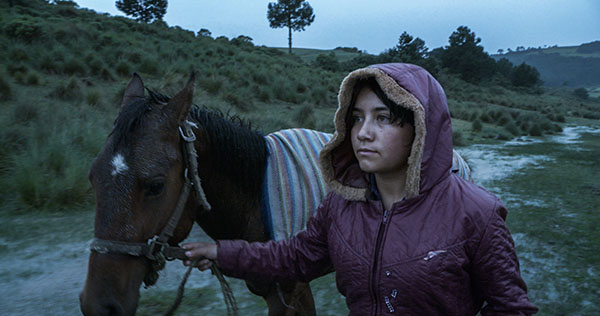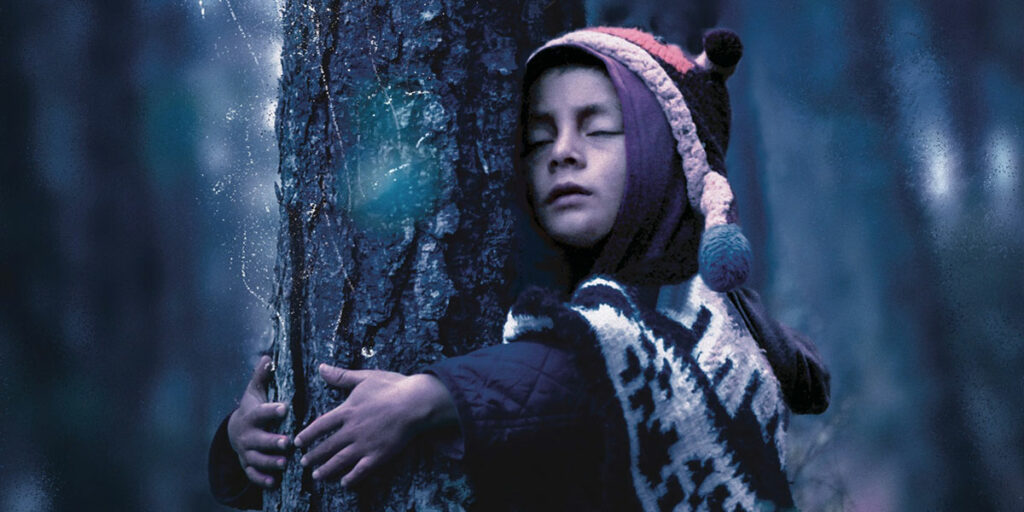Set in a tiny village in the Mexican highlands, Tatiana Huezo’s The Echo is a mesmerising mosaic of a group of children growing up.
With The Echo (El Eco), director Tatiana Huezo once more shows her strengths in both documentary and fiction forms. After Tempestad (2016), her documentary about human trafficking in Mexico, Huezo made Prayers for the Stolen (2021), a fiction feature, although one based on very real current events. The Echo sees Huezo return to her documentarian roots, but the Salvadoran Mexican director still manages to inject enthralling moments of fantasy into the grounded reality. Like with her other films, there is also a firm focus on children, both on their fortitude in difficult situations and their wondrously unique views of the world.
The titular El Echo is a remote village in Mexico, a bucolic setting of few residents who tend to their livestock and crops when the weather permits them. There is great happiness within their lives, but there are testing elements too. The Echo is told via the viewpoints of the children of the village. They witness death and birth, experience nature first hand, and look on with amazement at the world that surrounds them. It is an astonishing experience, watching these children move along in front of our very eyes on their journey to adulthood. As dense and weighty as The Echo is, perhaps its most quintessential trait is this unbridled celebration of childhood.
Considering the subject matter, there is inevitably a more playful tone to The Echo than with Huezo’s previous films. There is a terrific lack of filter on proceedings: one lengthy joke from a young girl is a zinger; the image of an even younger boy licking and then hugging a tree is utterly delightful. These moments are like a tonic for the soul, and Huezo’s care for these children and their parents is clear. Her affinity and empathy for others is as clear in The Echo as it is in all her other films. The Echo highlights how each child is unique, particularly in one classroom scene where three older kids explain vibrations and sound to younger pupils, all in different ways.

Aside from the frequently light-hearted nature of The Echo, there are also heavier undercurrents of misogynistic traditions and grief. The way the passing of a family’s elderly grandmother is captured bears similarities with Petite Maman (2021), in how children grieve and cope with loss in a very specific way. In El Echo, the women generally take care of the homes and children, whilst the men work away; there is a gut-wrenching moment when a young boy is told to leave his plate, for it’s a woman’s job to do that, much to his older sister’s silent dismay. In The Echo, the balance between these lighter and darker parts is so impressive.
This is all made possible by Huezo and her crew. The Echo is observational but rife with symbolism. Huezo and Lucrecia Gutierréz’s (Tempestad) editing allows these tonal shifts to organically flow without ever jolting, and their thoughtful cuts allow the considered symbolism to shine through at the right times. Ernesto Pardo’s (La Vocera) achingly beautiful cinematography further enhances these moments and gives The Echo a magical twinge, especially when it takes flight into moments of light fiction. The surrounding Mexican wilderness is somehow unwelcoming but accepting, formidable yet deeply personal to the villagers.
Despite not having an obvious central driving force, The Echo ends with such a refined and striking poignancy. Few films or directors have been able to capture children in such a compassionate and considered way; it is also noticeable how influential the adults of The Echo are, despite being in far fewer scenes than the children. Frequently we see a child’s watchful eye observing their parents from afar, their very personality shaping there and then. This very sensory, very cinematic experience will enchant you from start to finish. There is so much to glean from The Echo; it is invigorating cinema.
The Echo premiered at the Berlin Film Festival on February 17-26, 2023 and will be released in UK cinemas on July 26, 2024.

